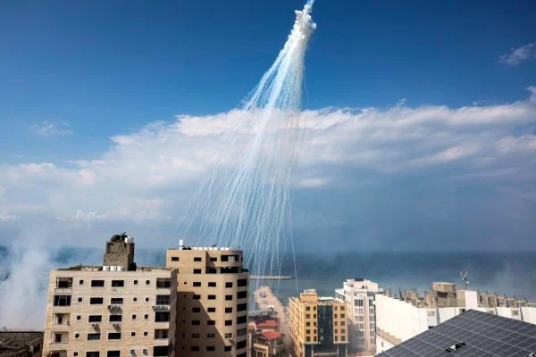
Israel's bombardment of Gaza continues on Oct. 11, 2023. (Credit: Mohammed Abed/AFP)
In both Lebanon and Gaza, Israel has been accused of violating international law by using white phosphorus munitions. This has been confirmed by Human Rights Watch (HRW), which states that the use of these weapons "exposes civilians to the risk of serious and long-term injuries." HRW documented the use of white phosphorus by gathering testimonies and analyzing videos from Oct. 10 and 11, which showed "aerial bursts of white phosphorus from artillery fire above the Gaza port and two rural areas along the Lebanese-Israeli border."
What is white phosphorus?
White phosphorus is a highly flammable substance. Exposure to oxygen ignites it, creating extremely high temperatures (up to 815 degrees Celsius), light, and thick white smoke. In the military context, it is used to generate a smoke screen to conceal the visual movements of troops. It also disrupts infrared optics and weapon tracking systems, providing protection against guided weapons such as anti-tank missiles. However, it can also be used as an incendiary weapon. Contact with the skin can cause severe burns. White phosphorus munitions can also start fires that can destroy equipment and buildings. Israel has admitted to using white phosphorus weapons in previous conflicts in Gaza and Lebanon.
What does international law say?
Contrary to what one might think, white phosphorus munitions and bombs are not considered chemical weapons because they primarily operate through the heat they generate, rather than their toxicity. However, this does not mean that their use is always legal under international law. "The use of incendiary weapons is governed by Protocol III to the Convention on Certain Conventional Weapons, ratified by Palestine and Lebanon but not by Israel," said Lama Fakih, HRW's Middle East director. "Protocol III prohibits the use of air-dropped incendiary weapons in civilian areas," she added. However, Israel takes advantage of an ambiguity in the international convention by launching attacks from the ground. "This does not mean, though, that this action is legal, as it makes no distinction between civilian and military targets, as clearly required by international law. Furthermore, rural areas in southern Lebanon and the Gaza port have been hit," noted Fakih. Despite this, the international community has largely turned a blind eye to these allegations.